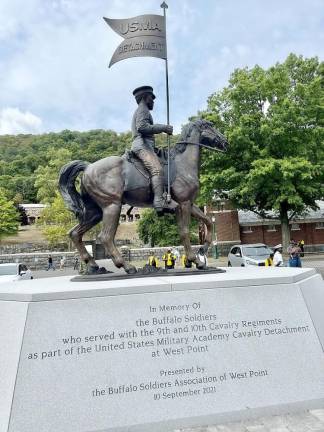West Point, bikers commemorate storied African-American soldiers
Veterans. A new Buffalo Riders Motorcycle Exhibit at Velocipede Museum opening in Newburgh and a memorial celebration at West Point’s Buffalo Soldier field were among commemorative events.



The Buffalo Soldiers Association of West Point and Buffalo Soldiers Motorcycle Club (MC) of West Point, in cooperation with the United States Military Academy, commemorated the first anniversary of the dedication of the Buffalo Soldier Monument over Labor Day weekend.
On Saturday, activities featured the opening of the new Buffalo Riders MC Exhibit at the Velocipede Museum (affiliated with the nearby Motorcyclepedia Museum), on Newburgh’s reviving Liberty Street. The next day was the memorial celebration at West Point’s Buffalo Soldier field.
Processions of nearly a hundred motorcycles around the area included other veteran rider groups such as the Orange County American Legion Riders, Orange County ‘Nam Knights MC, Chosin Few Leathernecks MC, U.S. Military Vets MC of the Hudson Valley, and the Buffalo Soldiers MC, with participants from New York, New Jersey, Massachusetts, Pennsylvania and as far away as Delaware, Maryland, Virginia and Germany.
With support from the Academy, which once maintained a detachment of the 9th and 10th Cavalry Regiments to train cadets on equestrian skills, the Association and MC have worked to honor and raise awareness of the legacy and lessons of this storied group of African-American soldiers. On September 10, 2021, they finally received due recognition of their service and sacrifice with the dedication of the Buffalo Soldier Monument.
Comprised of former slaves, freemen and black Civil War veterans, the “Buffalo Soldiers” were named by the native American tribes they encountered on the Great Plains out of respect for their horsemanship and bravery. As all soldiers of color, they struggled for recognition and inclusion as equals, through Jim Crow, segregation, and other forms of racial discrimination through the civil rights movements of the 1960s.
The guest of honor at the commemoration was Reverend Robert W. Dixon, the last living Buffalo Soldier before the 9th and 10th Regiments, like all horsed units in the Army, eventually disbanded in 1952. He celebrates his 100th birthday next week.
Keynote speaker retired Brigadier General Ty Seidule, who headed the history department at West Point, explained how units of color in the U.S. military often maintained superior disciplinary and mission performance records, in spite of many obstacles. “They are an integral part of the American story,” he noted.
He also related how black cadets and officers conducted one of the most successful protest movements in American military history, in resistance to president Nixon’s order to put a Confederate monument on Trophy Point. “As youths, they instituted remarkable change in our country,” the former commander of 82nd Airborne Division troops in the Persian Gulf war pointed out.
Seidule and others stressed the importance of remembering and understanding our common history – the bad as well as the good –for Americans to find a pathway forward into the future. Hence the importance of commemorations such as this.
“Nothing worth doing is easy,” Dr. Aundrea Matthews, a Buffalo Soldier descendant who led the over decade-long effort to erect the monument, reminded the audience. Staff Sergeant Sanders H. Matthews, Sr., who was also the first African-American member of the Highland Falls Police Department and whose likeness sits atop the monument, was her grandfather.
Photo captions:
Dr. Aundrea Matthews (left) presents a plaque signed by original members of the Buffalo Soldiers, to Rev. Robert W. Dixon, the last living Buffalo Soldier who turns 100 later this month.
Staff Sergeant Sanders H. Matthews, Sr. sits atop the now year-old Buffalo Soldier Monument at West Point.
Buffalo Soldier riders display their chapter colors at the Saturday afternoon fish fry that featured live music by local singer-songwriter Ayanna Martine, door prizes, and a school supply giveaway.
Story and photos contributed by Chris Holshek
Comprised of former slaves, freemen and black Civil War veterans, the “Buffalo Soldiers” were named by the native American tribes they encountered on the Great Plains out of respect for their horsemanship and bravery.